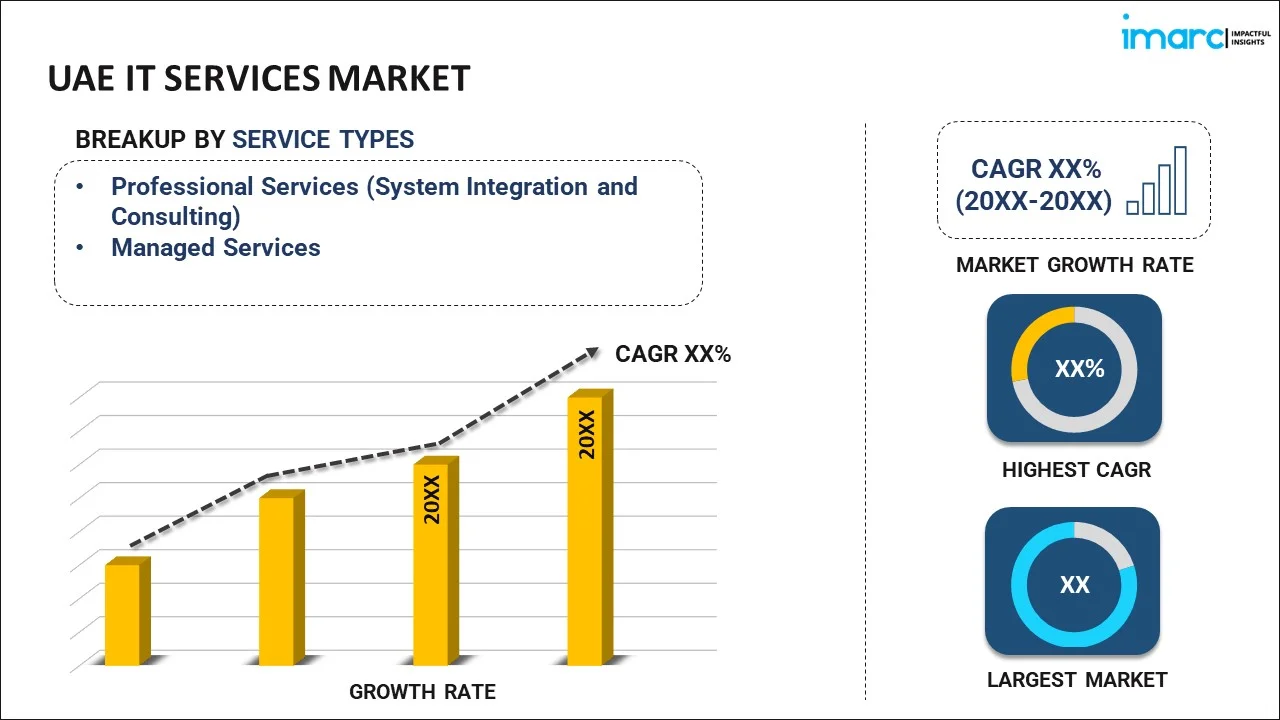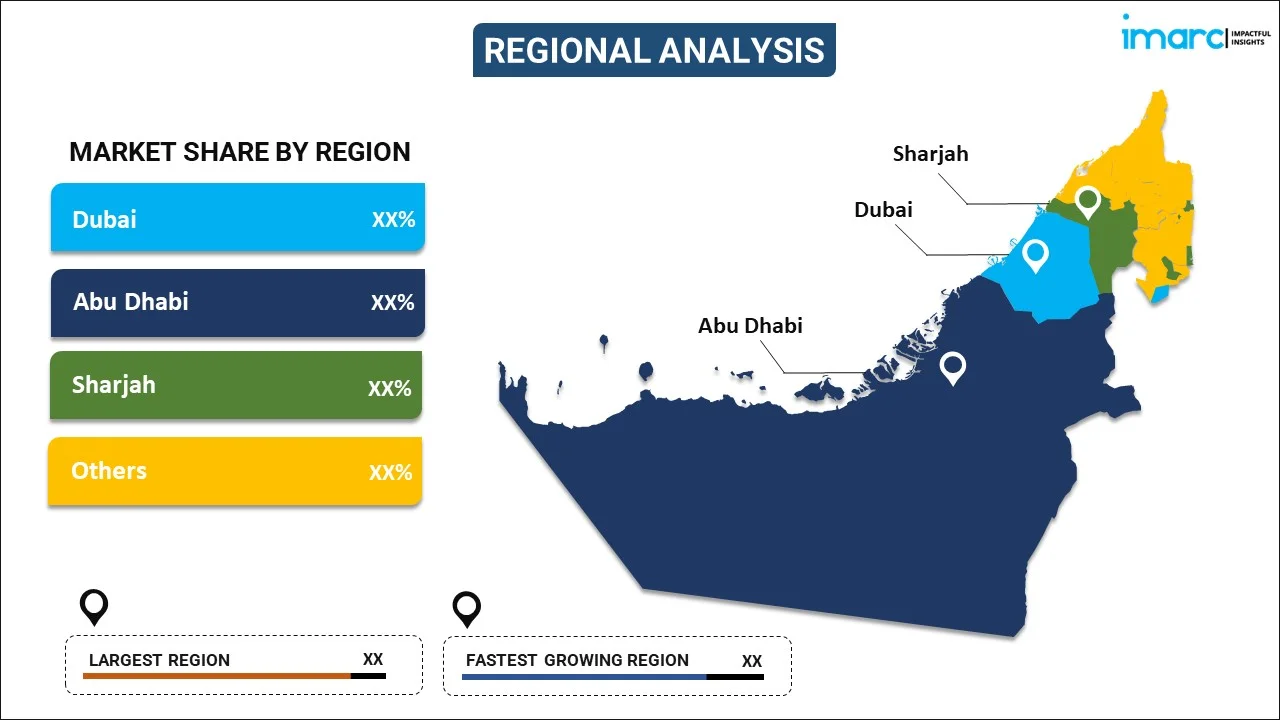
UAE IT Services Market Report by Service Type (Professional Services (System Integration and Consulting), Managed Services), Enterprise Size (Small and Medium-sized Enterprises, Large Enterprises), Deployment Mode (On-premises, Cloud-based), End Use Industry (BFSI, Telecommunication, Healthcare, Retail, Manufacturing, Government, and Others), and Region 2025-2033
UAE IT Services Market Overview:
The UAE IT services market size reached USD 5,880.0 Million in 2024. Looking forward, IMARC Group expects the market to reach USD 12,876.5 Million by 2033, exhibiting a growth rate (CAGR) of 9.10% during 2025-2033. The increasing pace of digitalization in the UAE, development of cloud computing, and the rising investments in smart city projects represent some of the key factors driving the growth of the market.
|
Report Attribute
|
Key Statistics
|
|---|---|
|
Base Year
|
2024
|
|
Forecast Years
|
2025-2033
|
|
Historical Years
|
2019-2024
|
|
Market Size in 2024
|
USD 5,880.0 Million |
|
Market Forecast in 2033
|
USD 12,876.5 Million |
| Market Growth Rate 2025-2033 | 9.10% |
UAE IT Services Market Trends:
Digital Transformation Across Various Sectors
One of the key drivers for the market is the increased pace of the digitization of the business in the UAE and the nearby countries in the region. Advanced technology is being implemented in many industries, including finance, healthcare, retail, and manufacturing. In March 2021, Dubai Digital Authority revealed the results of the Dubai paperless strategy that was declared in 2018, revealing that the Dubai Electricty and Water Authority (DEWA) became the first government department to go entirely paperless. DEWA eliminated all paper transactions and provided all its services using digital channels. At the same time, other government departments are progressing according to the plan to achieve 100 per cent digitization. The development of cloud computing, combined with big data analytics, as well as IoT solutions has become mainstream, as companies want to remain competitive in the modern economy. Such measures as the UAE Vision 2021, that focus on the development of digital infrastructure, also contribute to the growth of IT services’ demand. These initiatives are to make UAE as the global front runner in innovation and to create a favourable environment for the IT service delivers to prosper.
Rising Investments in Smart City Projects
The heavy spending on smart city related initiatives is also another contributing factor of the UAE IT services market. Dubai's government introduced a plan to make the city smart using innovative technology, digital tools, and smart policies. The Dubai Plan 2021, worth approximately $7 to $8 billion, provides upgraded economic and social services for residents, transforms government services into data-based smart solutions, and improves the development of the city's infrastructure. Dubai's smart city strategy includes over 100 initiatives, including a plan to transform 1,000 government services into smart services. Smart cities are an important agenda in the UAE where the government aims to establish smart cities to raise the standard of living for the people, tackle environmental problems, and advance the economy. These projects entail the enhancement of features in smart cities using some of the modern technologies for smart cities such as AI, ML, and blockchain. Cities, such as Dubai and Abu Dhabi, are leaders in the proper use of the smart solutions within transportation, energy consumption, safety, and many others. This approach to smart cities heavily relies on the development of IT systems, resulting in a strong demand for specialists in this field. The construction of such complex IT infrastructures for cities requires a concentrated application of expert knowledge and resources.
UAE IT Services Market News:
- In February 2024, Etisalat by e& Egypt entered into a strategic partnership with Amazon Web Services (AWS) to revolutionize cloud transformation in the tech sector. The partnership was signed during the Mobile World Congress (MWC) in Barcelona, Spain. Under the collaboration, Etisalat by &e in Egypt will offer cutting-edge cloud services with the aim of delivering advanced speeds, increased data transfer capabilities, and expanded storage capacity.
- In March 2023, Injazat, a leading regional champion in Digital Transformation and Smart Cities, announced a partnership with Nexthink, the leader in Digital Employee Experience (DEX) management software. With Nexthink Infinity, Injazat can deliver the world’s leading DEX Management platform to help IT teams close the gap – to measure and manage the digital employee experience at every moment.
UAE IT Services Market Segmentation:
IMARC Group provides an analysis of the key trends in each segment of the market, along with forecasts at the country level for 2025-2033. Our report has categorized the market based on service type, enterprise size, deployment mode, and end use industry.
Service Type Insights:

To get more information on this market, Request Sample
- Professional Services (System Integration and Consulting)
- Managed Services
The report has provided a detailed breakup and analysis of the market based on the service type. This includes professional services (system integration and consulting) and managed services.
Enterprise Size Insights:
- Small and Medium-sized Enterprises
- Large Enterprises
A detailed breakup and analysis of the market based on the enterprise size have also been provided in the report. This includes small and medium-sized enterprises and large enterprises.
Deployment Mode Insights:
- On-premises
- Cloud-based
A detailed breakup and analysis of the market based on the deployment mode have also been provided in the report. This includes on-premises and cloud-based.
End Use Industry Insights:
- BFSI
- Telecommunication
- Healthcare
- Retail
- Manufacturing
- Government
- Others
A detailed breakup and analysis of the market based on the end use industry have also been provided in the report. This includes BFSI, telecommunication, healthcare, retail, manufacturing, government, and others.
Regional Insights:

- Dubai
- Abu Dhabi
- Sharjah
- Others
The report has also provided a comprehensive analysis of all the major regional markets, which include Dubai, Abu Dhabi, Sharjah, and Others.
Competitive Landscape:
The market research report has also provided a comprehensive analysis of the competitive landscape in the market. Competitive analysis such as market structure, key player positioning, top winning strategies, competitive dashboard, and company evaluation quadrant has been covered in the report. Also, detailed profiles of all major companies have been provided.
UAE IT Services Market Report Coverage:
| Report Features | Details |
|---|---|
| Base Year of the Analysis | 2024 |
| Historical Period | 2019-2024 |
| Forecast Period | 2025-2033 |
| Units | Million USD |
| Scope of the Report | Exploration of Historical and Forecast Trends, Industry Catalysts and Challenges, Segment-Wise Historical and Predictive Market Assessment:
|
| Service Types Covered | Professional Services (System Integration and Consulting), Managed Services |
| Enterprise Sizes Covered | Small and Medium-sized Enterprises, Large Enterprises |
| Deployment Modes Covered | On-premises, Cloud-based |
| End Use Industries Covered | BFSI, Telecommunication, Healthcare, Retail, Manufacturing, Government, Others |
| Regions Covered | Dubai, Abu Dhabi, Sharjah, Others |
| Customization Scope | 10% Free Customization |
| Post-Sale Analyst Support | 10-12 Weeks |
| Delivery Format | PDF and Excel through Email (We can also provide the editable version of the report in PPT/Word format on special request) |
Key Questions Answered in This Report:
- How has the UAE IT services market performed so far and how will it perform in the coming years?
- What is the breakup of the UAE IT services market on the basis of service type?
- What is the breakup of the UAE IT services market on the basis of enterprise size?
- What is the breakup of the UAE IT services market on the basis of deployment mode?
- What is the breakup of the UAE IT services market on the basis of end use industry?
- What are the various stages in the value chain of the UAE IT services market?
- What are the key driving factors and challenges in the UAE IT services?
- What is the structure of the UAE IT services market and who are the key players?
- What is the degree of competition in the UAE IT services market?
Key Benefits for Stakeholders:
- IMARC’s industry report offers a comprehensive quantitative analysis of various market segments, historical and current market trends, market forecasts, and dynamics of the UAE IT services market from 2019-2033.
- The research report provides the latest information on the market drivers, challenges, and opportunities in the UAE IT services market.
- Porter's five forces analysis assist stakeholders in assessing the impact of new entrants, competitive rivalry, supplier power, buyer power, and the threat of substitution. It helps stakeholders to analyze the level of competition within the UAE IT services industry and its attractiveness.
- Competitive landscape allows stakeholders to understand their competitive environment and provides an insight into the current positions of key players in the market.
Need more help?
- Speak to our experienced analysts for insights on the current market scenarios.
- Include additional segments and countries to customize the report as per your requirement.
- Gain an unparalleled competitive advantage in your domain by understanding how to utilize the report and positively impacting your operations and revenue.
- For further assistance, please connect with our analysts.
 Request Customization
Request Customization
 Speak to an Analyst
Speak to an Analyst
 Request Brochure
Request Brochure
 Inquire Before Buying
Inquire Before Buying




.webp)




.webp)












